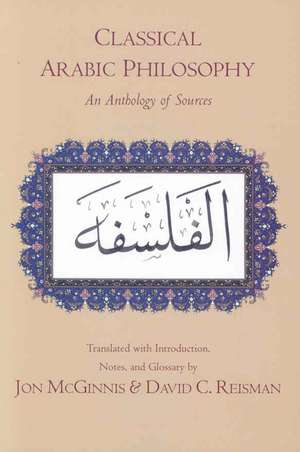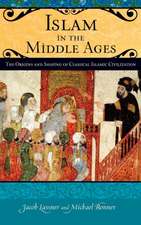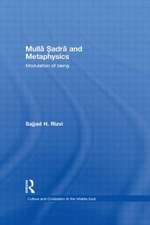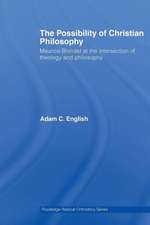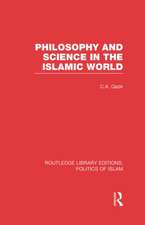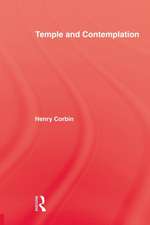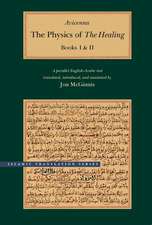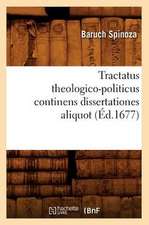Classical Arabic Philosophy: An Anthology of Sources
Traducere de Jon McGinnis, David C. Reismanen Limba Engleză Paperback – 15 mar 2007
| Toate formatele și edițiile | Preț | Express |
|---|---|---|
| Paperback (1) | 216.73 lei 3-5 săpt. | +51.88 lei 7-13 zile |
| Hackett Publishing Company – 15 mar 2007 | 216.73 lei 3-5 săpt. | +51.88 lei 7-13 zile |
| Hardback (1) | 483.80 lei 3-5 săpt. | |
| Hackett Publishing Company – 15 mar 2007 | 483.80 lei 3-5 săpt. |
Preț: 216.73 lei
Preț vechi: 241.11 lei
-10% Nou
Puncte Express: 325
Preț estimativ în valută:
41.47€ • 43.45$ • 34.28£
41.47€ • 43.45$ • 34.28£
Carte disponibilă
Livrare economică 22 martie-05 aprilie
Livrare express 08-14 martie pentru 61.87 lei
Preluare comenzi: 021 569.72.76
Specificații
ISBN-13: 9780872208711
ISBN-10: 0872208710
Pagini: 464
Dimensiuni: 6 x 228 x 23 mm
Greutate: 0.63 kg
Editura: Hackett Publishing Company
Colecția Hackett Publishing Company, Inc (US)
ISBN-10: 0872208710
Pagini: 464
Dimensiuni: 6 x 228 x 23 mm
Greutate: 0.63 kg
Editura: Hackett Publishing Company
Colecția Hackett Publishing Company, Inc (US)
Recenzii
"This book will make a major impact on the study, and especially the teaching, of Arabic philosophy. A major difficulty with this field has been the lack of any adequate textbook of sources... Reisman and McGinnis not only provide here a rich selection of texts that could be the basis for even a full-year course on Arabic thought, but also manage to translate several important works for the first time; they also include some standards that would probably be missed were they not here. It will no doubt become the standard anthology used in courses on Arabic philosophy, and I will use it this way myself. The team of McGinnis and Reisman is an ideal one... All in all, this project is to be greeted with immense enthusiasm." -- Peter Adamson, King's College London.
"This is a very fine, well conceived collection of philosophical materials that display the intellectual rigor, power, and insights of the thinkers of the Arabic tradition... The Introduction is written at a level appropriate for undergraduates and graduate students... Teachers not expert in the area will find it valuable as a guide for their students... far superior to anything currently available. It is suitable for adoption not only for courses in Arabic philosophy but also for any general courses in medieval philosophy." -- Richard C Taylor, Marquette University.
This fine piece of linguistic work brings to non-Arabists some representative samplings from dozens of the most seminal philosophers that the Arabic-speaking world has produced. Most of the outstanding minds are present, from traditionalists to the most speculative thinkers. . . . [T]his anthology succeeds in offering, in an English translation that is both accessible to readers and faithful to the writers, a comprehensive range of outlooks and perspectives highlighting almost half a millennium (9th-13th centuries CE). . . . The broad range covered is a tribute to the anthologists' judgment and skills. --S.P. Blackburn, CHOICE
The anthology produced by Jon McGinnis and David Reisman is a welcome development because it makes accessible a range of key texts covering the spread of philosophical concern in the "classical" period of philosophy in Islam. As they are both Arabists and medievalists with a philosophical training, they have successfully rendered philosophical Arabic into a sophisticated English idiom accessible to students in Islamic thought, medieval studies, and the history of philosophy. In a growing field of study with a paucity of available primary sources in translation, this anthology is greatly welcome and will no doubt become the standard text used in many medieval philosophy, Islamic philosophy, and religious studies courses. The translations are fluent, sophisticated, and well supported with endnotes on the Arabic textual emendations and footnotes referring to the wider ancient and medieval context. A useful bibliography is appended, as is a quite excellent glossary of terms, Arabic-English and vice versa. --Sajjad H. Rizvi, University of Exeter
"This is a very fine, well conceived collection of philosophical materials that display the intellectual rigor, power, and insights of the thinkers of the Arabic tradition... The Introduction is written at a level appropriate for undergraduates and graduate students... Teachers not expert in the area will find it valuable as a guide for their students... far superior to anything currently available. It is suitable for adoption not only for courses in Arabic philosophy but also for any general courses in medieval philosophy." -- Richard C Taylor, Marquette University.
This fine piece of linguistic work brings to non-Arabists some representative samplings from dozens of the most seminal philosophers that the Arabic-speaking world has produced. Most of the outstanding minds are present, from traditionalists to the most speculative thinkers. . . . [T]his anthology succeeds in offering, in an English translation that is both accessible to readers and faithful to the writers, a comprehensive range of outlooks and perspectives highlighting almost half a millennium (9th-13th centuries CE). . . . The broad range covered is a tribute to the anthologists' judgment and skills. --S.P. Blackburn, CHOICE
The anthology produced by Jon McGinnis and David Reisman is a welcome development because it makes accessible a range of key texts covering the spread of philosophical concern in the "classical" period of philosophy in Islam. As they are both Arabists and medievalists with a philosophical training, they have successfully rendered philosophical Arabic into a sophisticated English idiom accessible to students in Islamic thought, medieval studies, and the history of philosophy. In a growing field of study with a paucity of available primary sources in translation, this anthology is greatly welcome and will no doubt become the standard text used in many medieval philosophy, Islamic philosophy, and religious studies courses. The translations are fluent, sophisticated, and well supported with endnotes on the Arabic textual emendations and footnotes referring to the wider ancient and medieval context. A useful bibliography is appended, as is a quite excellent glossary of terms, Arabic-English and vice versa. --Sajjad H. Rizvi, University of Exeter
Cuprins
Introduction. Al-Kindi. Ar-Razi. Al-Farabi. The Baghdad Peripatetics: Abu Bishr Matt; Yahya ibn Adi; Abu Sulayman as-Sijistani. Ibn Sina. Al-Ghazali. Ibn Bajja. Ibn Tufayl. Ibn Rushd. As-Suhrawardi. Index.
